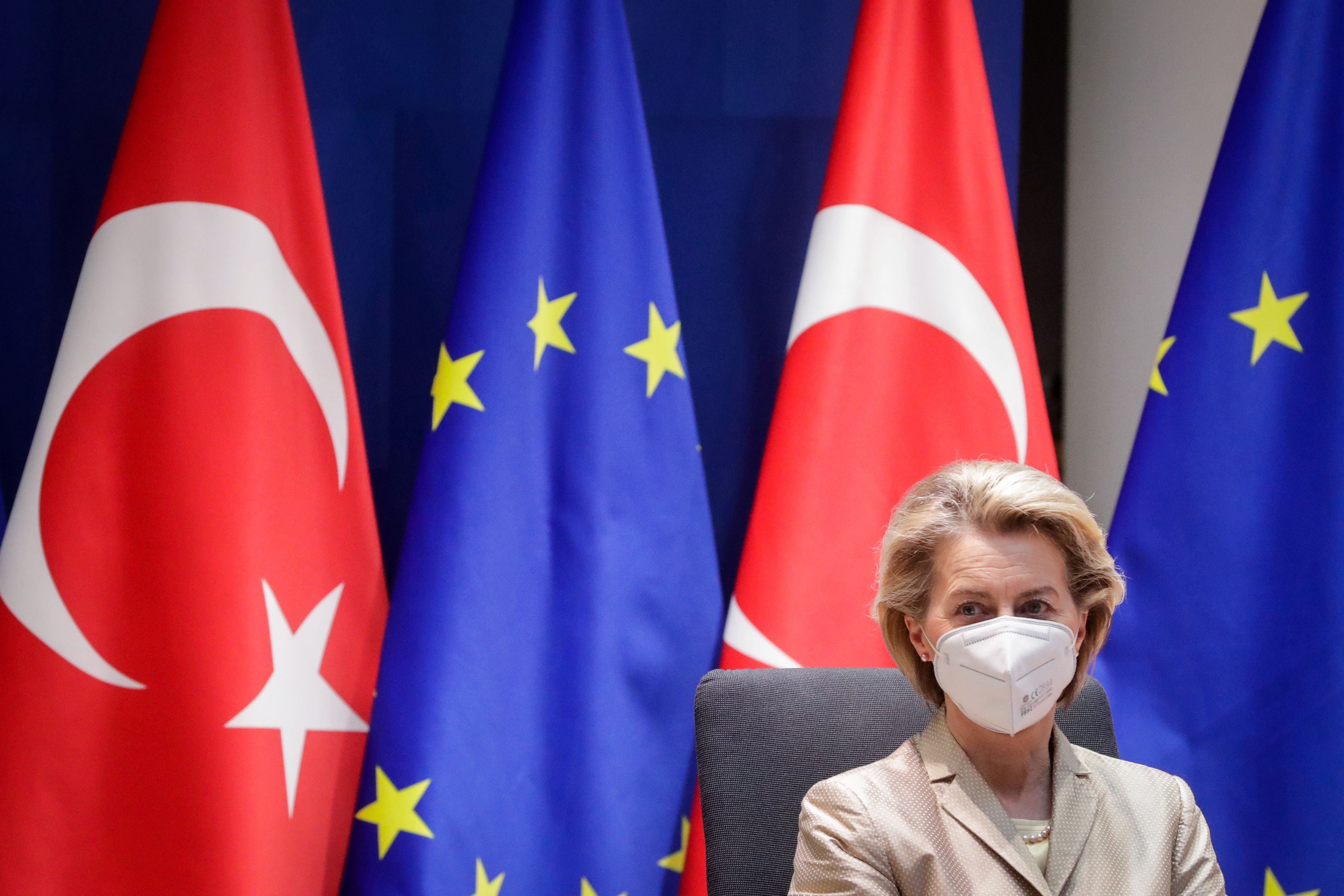Turkey: The European Union’s Adversarial Partner

Future Shape of EU-Turkey Relations
Work on the EU’s new approach to Turkey intensified in the middle of last year as a result of the accumulation of problems caused by the country’s foreign policy. Differing positions on issues such as the civil war in Libya and Turkish operations in Syria were acerbated by Turkey’s migration blackmail against the EU at the turn of February and March 2020 and the tensions in Turkish relations with the Member States, particularly France, Greece and Cyprus. This not only destabilised European-Turkish relations but also influenced the EU’s involvement in the world, for example, the tensions between the Republic of Cyprus and Turkey resulted in the former blocking EU sanctions against Belarus.
The first step towards establishing a new model of relations was the visit to Ankara of the High Representative for Foreign and Security Policy Josep Borrell on 6 July last year. The politician focused on problems in European-Turkish relations and did not mention the accession negotiations. This heralded a major change in the EU’s approach towards Turkey, as so far the negotiations have formed the basis of mutual relations. Borrell was also obliged by the Member States to present a proposal aimed at resuming the dialogue and reducing tensions in relations with Turkey, along with a catalogue of measures that the EU could implement if the state did not abandon its provocative actions. Borrell’s report was presented to the European Council (EUCO) on 25-26 March this year. In the summit’s conclusions, EU leaders announced their readiness to “engage in relations with Turkey in a staged, proportionate and reversible manner” as well as to defend the interests of the Member States. They did not mention the accession negotiations, but stressed that human rights and the rule of law remain an “integral part” of the EU-Turkey dialogue. More details on the shape of the relations came in a visit by the European Commission and EUCO presidents to Ankara on 6 April this year. They presented Turkish President Recep Tayyip Erdoğan with a proposal for enhanced cooperation in four areas: economic (e.g., modernisation of the customs union), high-level dialogue (priority topics include combating climate change and public health), people-to-people contacts (e.g., Turkey’s participation in the Erasmus+ or Horizon Europe programmes), and migration (e.g., continuation of the 2016 agreement). The EU leaders emphasised that cooperation was conditional on Turkey maintaining its non-confrontational policy. Drawing attention to the reversibility of the EU’s approach was meant to indicate the possibility of imposing sanctions in the event of a deterioration of relations.
Challenges for EU-Turkey Relations
The attempts to rebuild relations with Turkey despite clear regression in the field of human rights in that country are associated with a cost to the image of the EU and a political price for European leaders. This was demonstrated by the events preceding the visit of the presidents of the European Commission and the Council of Europe. On 17 March, Turkey’s prosecutor general applied to the Constitutional Court to ban the opposition People’s Democratic Party (HDP; at the end of March the application was dismissed by the court on procedural grounds). On 18 March, human rights defender and HDP MP Ömer Faruk Gergerlioğlu was deprived of immunity (then arrested on 2 April), and on 20 March Erdoğan withdrew Turkey from the Council of Europe Convention on preventing and combating violence against women and domestic violence (Istanbul Convention). As a result, the EU initiative was criticised by some of the The potential for higher political costs could jeopardise the implementation of the new model, especially if there was a change of government in Germany, which plays a key role in shaping the EU’s policy towards Turkey.
A number of challenges are also related to other aspects of Turkey’s domestic policy. Erdoğan’s alliance with nationalists may induce him to resume aggressive actions against the EU if détente in relations with it does not bring quick economic benefits. The strengthening of authoritarianism in Turkey also weakens the effectiveness of the instruments of EU-Turkish cooperation. For example, the partners will not be able to use the potential of a modernised customs union unless Turkey implements rule-of-law reforms that create the conditions for sustainable investment. Differences of opinion as to the pace of its implementation are also a challenge for the new model. The EU is committed to a gradual commitment, dependent on Turkey meeting various criteria. For example, the modernisation of the customs union will be possible only when the partners solve the problem related to the functioning of the current regime, meaning after Turkey has eliminated protectionist practices, which have been intensively used since 2016, and possibly (as indicated by the EUCO conclusions) after it recognises the Republic of Cyprus. The Turks, in turn, would like to make progress in the development of cooperation quickly without conditions. They also oppose the EU’s call to discuss human rights or the rule of law, arguing that such a dialogue could take place as part of the accession negotiations.
The most serious challenges for the new model of EU-Turkey relations may be related to maintaining unity on EU policy towards this country. For example, an inevitable conflict will arise when EU members opting for tougher policy towards Turkey (e.g., France, Cyprus, Greece) will not be willing to launch new instruments of cooperation at the pace that countries interested in closer cooperation with Turkey would like (e.g., Germany, Italy, Spain). The lack of unity on EU policy will ultimately doom the new approach to Turkey.
Conclusions and Recommendations
The proposed model of EU-Turkish relations has several advantages. It was developed based on the unity of the Member States, which strengthens the position of the EU towards Turkey. Moreover, it corresponds to the realities of EU-Turkish relations: it was impossible to continue accession negotiations with a candidate that was increasingly deviating from the Copenhagen criteria. The model providing incentives for cooperation in areas important to the interests of both partners (e.g., the economy or the situation of Syrian refugees) and real sanctions for hostile actions towards the EU creates the framework for a coherent and predictable approach to Turkey. This offers an opportunity to limit Turkish actions unfavourable to the EU and in the long run to rebuild the Union’s influence on the country. By strengthening the EU-Turkish economic ties and people-to-people contacts, the EU could gain stronger instruments to influence Turkey than was the case with the ineffective accession negotiations in recent years.
Successful implementation of the new model of relations with Turkey requires maintaining the unity of the Member States. This would be favoured by a clear definition in the intra-EU forum of the “boundary conditions” after which the EU would launch individual elements of cooperation, and sanctions—especially their type and severity—in reaction to hostile actions (e.g., restrictions on tourist traffic proposed in the Borrell report could be introduced in response to actions by the Turks against the security of Member States). It would also be beneficial if the EU would unequivocally signal to Turkey that political costs, which are a real problem for European policymakers, make it impossible to take positive steps immediately after the Turkish government violates human rights.
The proposal to re-evaluate EU-Turkish relations is beneficial for Poland. Therefore, it could mobilise partners from the Visegrad Group to maintain support for the new model. In this context, it may be important to persuade Hungary to support the joint position, which, due to its close ties with Turkey, could block sanctions against that country should they arise, and, consequently, undermine the effectiveness of the EU’s approach to Turkey.


